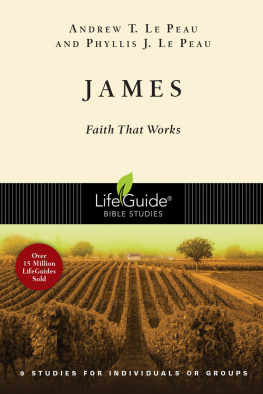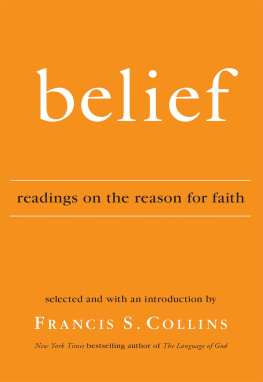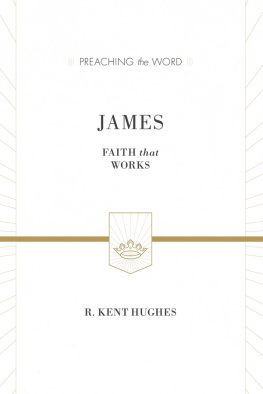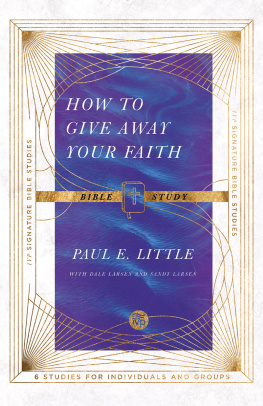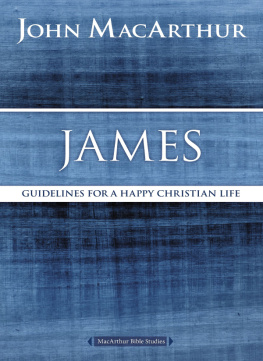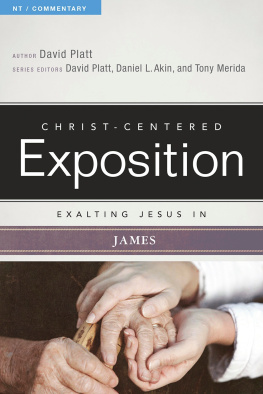Sommaire
Pagination de l'dition papier
Guide
JAMES
Faith That Works
9 STUDIES FOR INDIVIDUALS OR GROUPS
ANDREW T. &
PHYLLIS J. LE PEAU
InterVarsity Press
P.O. Box 1400, Downers Grove, IL 60515 World Wide Web: www.ivpress.com
1987, 1999 by Andrew T. and Phyllis J. Le Peau
Originally published as Faith That Works 1981 by InterVarsity Christian Fellowship of the United States of America.
All rights reserved. No part of this book may be reproduced in any form without written permission from InterVarsity Press.
InterVarsity Press is the book-publishing division of InterVarsity Christian Fellowship/USA, a student movement active on campus at hundreds of universities, colleges, and schools of nursing in the United States of America, and a member movement of the International Fellowship of Evangelical Students. For information about local and regional activities, write Public Relations Dept., InterVarsity Christian Fellowship/USA, 6400 Schroeder Rd., P.O. Box 7895, Madison, WI 53707-7895, or visit the IVCF website at www.intervarsity.org. LifeGuide is a registered trademark of InterVarsity Christian Fellowship.
All Scripture quotations, unless otherwise indicated, are taken from The Holy Bible, New International Version, NIV . Copyright 1973, 1978, 1984, 2011 by Biblica, Inc. Used by pemission of Zondervan. All rights reserved worldwide. www.zondervan.com. The NIV and New International Version are trademarks registered in the United States Patent and Trademark Office by Biblica, Inc.
Cover design: Cindy Kiple
Interior design: Jeanna Wiggins
Cover image: field landscape: Lars Van de Goor / Trevillion Images
ISBN 978-0-8308-6221-4 (digital)
ISBN 978-0-8308-3018-3 (print)
This digital document has been produced by Nord Compo.
GETTING THE
MOST OUT OF
JAMES
U nlike most books of the New Testament, the letter of James is best known for the people who dont like it. Its seen as a scalawag among the obviously Christ-centered letters of Paul and the love-concerned writings of John. People like love. They like Christ. They dont like James.
James is harsh and dogmatic. We feel the sting of his words even todayDont be deceived, You foolish person, You adulterous people, Now listen. We find James hard to take for good reason.
Of all the people who do not like James, Martin Luther is probably the most famous. Compared to the other solid New Testament writings, James, he felt, was full of strawempty, hollow. He virtually relegated the letter to a position of lesser Scripture. He believed that it taught salvation by works. And that would never do for Martin Salvation-by-Grace-Alone Luther. Because of Luthers feelings and those of others like him, Protestant Christians have tended to ignore this book.
Yet the early church saw it as a book bearing apostolic authority and, more importantly, as a book that bore Gods authority. James spoke a needed and empowered word to the churches. Thus it was included in the New Testament canon alongside Paul and John, carrying equal weight with their writings. Because it has been avoided and because it bears the full force of Gods Word, James deserves our special study.
And what does it have to tell us? James is practical. Take problems. James knows nobodys life is perfect. So he doesnt tell us how to live trouble free, but how to live when troubles hit. Do we complain? Or do we use them as an opportunity for growth?
Take words. We all talk. And sometimes we say things we wish we hadnt. James helps us use words more carefully, more constructively. Do they hurt others? Do they advance Gods kingdom? Are they truthful? Are they loving?
Take money. It flows around us (despite our protestations concerning tight budgets and taxes). Do we withhold it when others are in need? Do we put more value on worldly things than on the things of God?
Take time. If we have enough money, we know we never have enough time. We do all we can to get the most out of each hour of each day, filling our calendars with activity. But do we miss Gods will and perspective in the midst of our schedule making?
James is practicalmaybe too practical! So expect this study to be difficultnot because it will be hard to understand but because it will be all too easy to understand.
Who is this fellow James who makes us so uncomfortable? There are several people in the New Testament called James, including two apostles. Though they have never been completely certain, most church scholars have believed that a third man, James the brother of Jesus (Matthew 13:55; Mark 6:3), wrote this letter. While he probably rejected Jesus during his earthly ministry (along with the others in Jesus family) James certainly started following Jesus after his resurrection. In fact, James soon became the head of the church in Jerusalem.
He probably led the first church council in Jerusalem (Acts 15), which decided that Gentiles did not have to become Jews before they could be saved. This is an important factor in assessing Jamess view of faith and works (which is to be noted in light of 2:14-26).
Yet James was aware of the very Jewish make-up of the church in Jerusalem and required Paul to squelch the rumor that he, Paul, was telling Jews to abandon the law of Moses. James himself apparently followed Jewish law closely, enough so that he was known as James the Just. He died a martyr in A.D. 62.
James addresses his letter to the twelve tribes scattered among the nations. The twelve tribes could refer to Jewish Christians which through exile, enslavement, and trade were spread throughout the entire Mediterranean basin. More likely it refers simply to Christians since the New Testament compares the church to Israel (Galatians 6:16; 1 Peter 2:9-10). In any case, the letter is not addressed to one specific congregation, as Pauls letters were. It is therefore called a general, or catholic, epistle.
The purpose of this guide is to help you face squarely Jamess call for a consistent Christian life, for a practical faith. We seek to do this through nine studies each covering about half a chapter each. This may not seem like much, but Jamess proverb-like compactness calls for it. You may not necessarily like James when you finish. But it is our prayer that through it God will give you a faith that works.
SUGGESTIONS FOR INDIVIDUAL STUDY
As you begin each study, pray that God will speak to you through his Word.
Read the introduction to the study and respond to the personal reflection question or exercise. This is designed to help you focus on God and on the theme of the study.
. Each study deals with a particular passageso that you can delve into the authors meaning in that context. Read and reread the passage to be studied. If you are studying a book, it will be helpful to read through the entire book prior to the first study. The questions are written using the language of the New International Version, so you may wish to use that version of the Bible. The New Revised Standard Version is also recommended.

